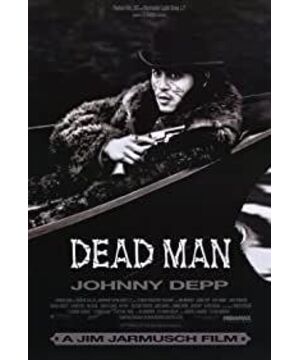"Do you know my poetry?" "Do you have sometobacco?" Shall a man depart the world withdignity? Will he ever be understood or recognized? "Dead Man" itself provided us with a poetic answer, that is he will never be alone . Stranger new in town, stories like this we must have heard a lot. With a quick burst tongue of fire, Williamdescendedonto the pinto but he ascended into his very journey of spirit. A defiler and anabolishedman in the cannibal west, with aachallenge of losing identity and a threat of death. William's fate led him to another man who also lost his identity. Two lonerangers' journey started off whimsical and cynical. Until William's anguish made him realize his true state of life, when oneuprise, it shall be graceful. After single handedly raising his own bounty,William seemed to understand what really lies behind the roughedge of the wild west and the grumpiness of its spirit. Enthralling black and white perspective, "Dead Man" taught us how to distinguishinjustice and loyalty but also offered us an atrocious experience of viewing. Greatcolonialismbrought us the ripeness of this land and sadness to everyone else. Each white person's death was an rigorous remedy to a greater reconciliation. Every scrupulous steps William took after his realization, especially when he was laying down with the deer was a soul-trembling shot. It is so hard these days for people to have the heart and effort to understand and learn from each other, but William learned from "The eaglenever lost so much time as when he submitted to learn from the crow." What a subtlemetaphor,the colonists as the eagle never for a momentthought about learning from the crow, as they call them "Redskins". Instead, they brought plagues and bodies. Only if they knew that they have always been on the losing side. By witnessing William's transcendent and unflinching will and desire, and he turned death into hisfearless weapon. His journey was gifted with friendship and blessing. As a matter of fact, little did we know that "Nobody's death at the end means that no matter what happens, loyaltylies in both of their veins . Only if we can live with a righteous purpose and a kind heart , then bleakness of this world will fade.By witnessing William's transcendent and unflinching will and desire, and he turned death into hisfearless weapon. His journey was gifted with friendship and blessing. As a matter of fact, little did we know that "Nobody's death at the end means that no matter what happens, loyaltylies in both of their veins. Only if we can live with a righteous purpose and a kind heart , then bleakness of this world will fade.By witnessing William's transcendent and unflinching will and desire, and he turned death into hisfearless weapon. His journey was gifted with friendship and blessing. As a matter of fact, little did we know that "Nobody's death at the end means that no matter what happens, loyaltylies in both of their veins. Only if we can live with a righteous purpose and a kind heart , then bleakness of this world will fade.
View more about Dead Man reviews











